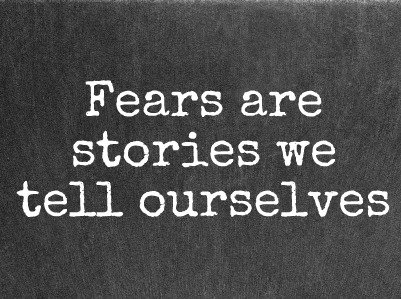
Fear is the great inhibitor.
When rational, fear is life-serving and life-protecting. However, the purpose of fear is avoidance. You rationally avoid things in order to obtain what life has to offer. You avoid an oncoming car when crossing a street in order to survive and live life. You avoid excessive fats and nicotine in order to live a happy and long life. Rational fears uphold life.
Most fears are not rational. Most fears involve avoidance for the sake of avoidance. They rest on the assumption, “If I avoid this situation, I’ll feel better.” This may be true. But as these avoidances pile up, life becomes one big avoidance game. In the process, life is less than fully lived — and in extreme cases, where one is paralyzed by fear, life is not lived at all. The bare minimum of physical survival is all that one has.
People’s irrational fears often lead them to magical thinking. A woman will marry a man because she believes he can and should protect her — from everything. Once married, she realizes that she still has her own life to live, and that only she — not another, even a loved one — can generate her happiness. As a result, there’s bitterness and disappointment. What drove her to marry the man on the false premise was fear. She married him to reduce fear.
People do all kinds of other things to reduce irrational fear. They drink, they abuse drugs, they gamble, they spend or do other things compulsively. These things have the seemingly practical effect of reducing fear. But it begs the question: How valid are the fears? How necessary is it to reduce them?
The alternative to indulging or being controlled by irrational fears is to embrace life. Embrace all that life has to offer, along with the attending risks and consequences. Life is one long series of challenges, with victories along the way but always new challenges created — even by the victories themselves.
How can you know if your fears are rational or irrational? By introspection. Always be brutally honest with yourself about precisely what you’re feeling. And be prepared to challenge your feelings when they’re wrong. Above all, make a commitment to live life fully and take on challenges despite fears.
The biggest mistake you can make, and the one I most commonly observe in people, is to avoid things, people or situations because of fear. It’s kind of like wanting material things but not being willing to pay for them. Everything has a cost. Almost everything in life involves confronting some fear if the thing is to be obtained — material thing, or not. Instead of burdening yourself with a life load of unmet challenges and unfulfilled dreams because of the “quick fix” of fear avoidance, why not embrace the thing that you fear and take it on? People talk about deliberately and regularly going out of their comfort zones — rationally, of course, when something makes sense and when it really has the possibility of advancing your life in some way. This is a good strategy. “Getting out my comfort zone” is a recipe for confronting your irrational fears deliberately, and actually growing and learning throughout all of life.
Fear is too often motivated by the search for an impossible and also unnecessary “security.” Security, in this context, usually means the absence of pain, risk or pressure. Life is not designed that way. Life’s values require continuous pursuit and continuous maintenance, throughout all of life and until the very end. There’s no getting around this fact. Stop looking for someone or something to “take care” of you in the sense of taking all this away. Nothing can change the way reality basically is.
Stop being afraid of life. Instead embrace it.
Be sure to “friend” Dr. Hurd on Facebook. Search under “Michael Hurd” (Rehoboth Beach DE). Get up-to-the-minute postings, recommended articles and links, and engage in back-and-forth discussion with Dr. Hurd on topics of interest.
